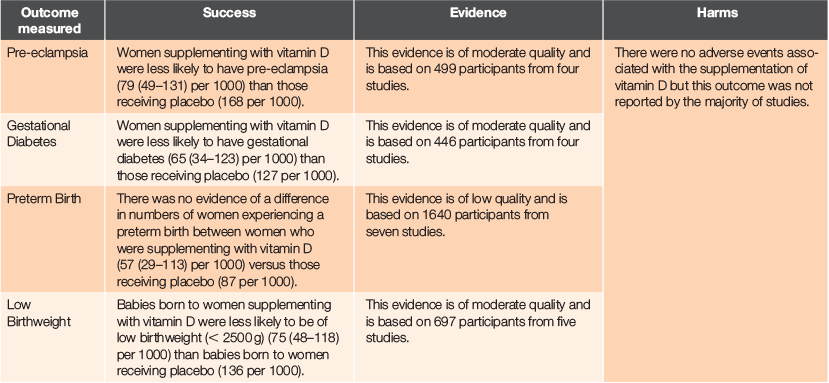Vitamin D supplementation: should this be standard practice in pregnant women?
Vanessa Jordan 1New Zealand Cochrane Fellow, University of Auckland, Auckland, New Zealand. Email v.jordan@auckland.ac.nz
Journal of Primary Health Care 11(3) 288-289 https://doi.org/10.1071/HC15945
Published: 30 September 2019
Journal Compilation © Royal New Zealand College of General Practitioners 2019 This is an open access article licensed under a Creative Commons Attribution-NonCommercial-NoDerivatives 4.0 International License
Cochrane review: Palacios C, Kostiuk LK, Peña‐Rosas JP. Vitamin D supplementation for women during pregnancy. Cochrane Database of Systematic Reviews 2019, Issue 7. Art. No.: CD008873. doi:10.1002/14651858.CD008873.pub4.
Background: Vitamin D is an essential nutrient. It is particularly important that pregnant women have sufficient vitamin D levels, as transfer of vitamin D from mother to fetus is essential for neonatal growth.1 There is however a worldwide problem with vitamin D deficiency.2 This especially affects women from the Middle East and women with darker skin colour but is also a problem for women of all ethnicities and from all global regions.3 This Cochrane review set out to determine the impact of vitamin D supplementation in pregnant women with regard to maternal and neonatal outcomes.4
Clinical Bottom Line: Supplementing pregnant women’s diets with vitamin D was shown to reduce rates of pre-eclampsia, gestational diabetes and reduce the numbers of infants born with low birthweight. It did not however affect the number of preterm births.4 As a note, trials did not measure pre-supplementation levels of vitamin D so it is not known if the majority of the participants were suffering from low vitamin D. Adverse effects due to the supplementation were also not well documented so it is unknown if this practice could have any deleterious effect. In addition, studies that supplemented vitamin D and calcium did show a slight increase in the numbers of women having a preterm birth and so routine supplementation with vitamin D in women already receiving calcium needs to be carefully considered.4

|
References
[1] World Health Organization. Vitamin and mineral requirements in human nutrition. 2005.[2] van Schoor N, Lips P. Worldwide vitamin D status. In Vitamin D. 2018, Elsevier. pp. 15–40.
[3] Palacios C, Gonzalez L. Is vitamin D deficiency a major global public health problem? J Steroid Biochem Mol Biol. 2014; 144 138–145.
| Is vitamin D deficiency a major global public health problem?Crossref | GoogleScholarGoogle Scholar | 24239505PubMed |
[4] Palacios C, Kostiuk LK, Peña‐Rosas JP. Vitamin D supplementation for women during pregnancy. Cochrane Database Syst Rev. 2019; CD008873
| Vitamin D supplementation for women during pregnancy.Crossref | GoogleScholarGoogle Scholar | 31348529PubMed |


